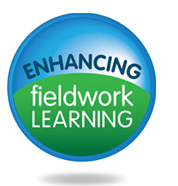 The University of Reading is part of a three-year Higher Education Academy (HEA)-funded project considering the use of technology in fieldwork to enhance student learning: Enhancing Fieldwork Learning.
The University of Reading is part of a three-year Higher Education Academy (HEA)-funded project considering the use of technology in fieldwork to enhance student learning: Enhancing Fieldwork Learning.
The project team, which includes Alice Mauchline and Julian Park from the School of Agriculture, Policy and Development here at Reading, engages primarily with Geography, Earth, Environmental and Biosciences (GEES) but is keen to work with any aligned disciplines whether in the UK or overseas. The driving factor is pedagogy, not technology – but technology is an enabler. Enhancing Fieldwork Learning focuses on using affordable, ubiquitous technologies such as iPads, digital cameras and social networks to address a series of problems that may arise during fieldwork, such as lack of student engagement or limited connectivity.
The project is now in its final year and has led to the production of a wide range of resources and publications which can be viewed on the project website at www.enhancingfieldwork.org.uk – including guides on using smartphones in fieldwork and geotagging photographs.

Julian Park speaking to staff and students at Reading at the ‘Sharing Good Practice’ event in July 2012
Enhancing Fieldwork Learning was represented at our ‘Sharing Good Practice’ event in July last year. Julian Park, who also holds the post of Associate Dean (Teaching & Learning) for the Faculty of Life Sciences at Reading and chairs the Digitally Ready Steering Group, was on hand to talk to staff and students about ways to promote fieldwork learning through the use of technology – with Julian’s own iPad appropriately clad in an armoured case.
The project team has recently contributed an article to the Guardian Higher Education Network on ‘Academic fieldwork: six ways to make it work on a budget’. Their briefing report on ‘The future of fieldwork in GEES’ outlines current undergraduate GEES fieldwork provision across a selection of HE institutions in the UK and explores how location, duration and cost of fieldwork to the student may change as a result of the introduction of increased tuition fees.